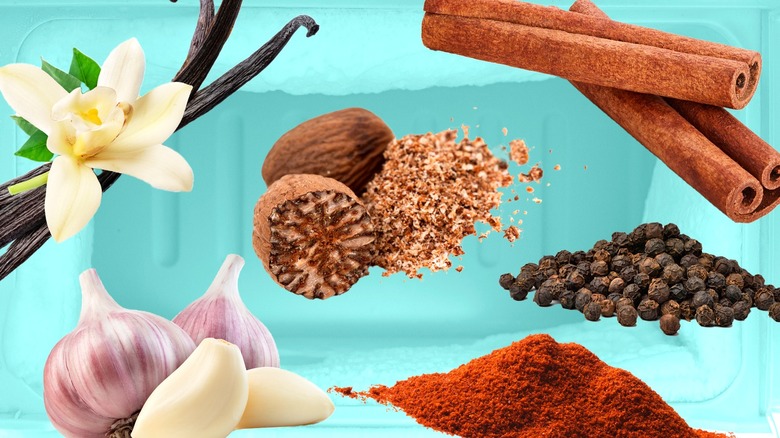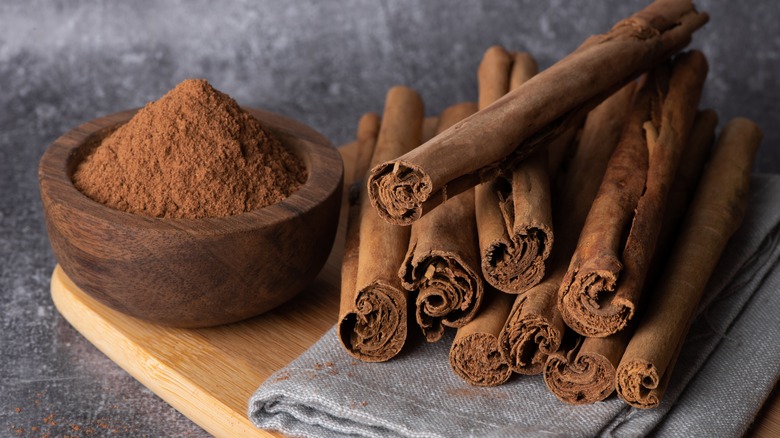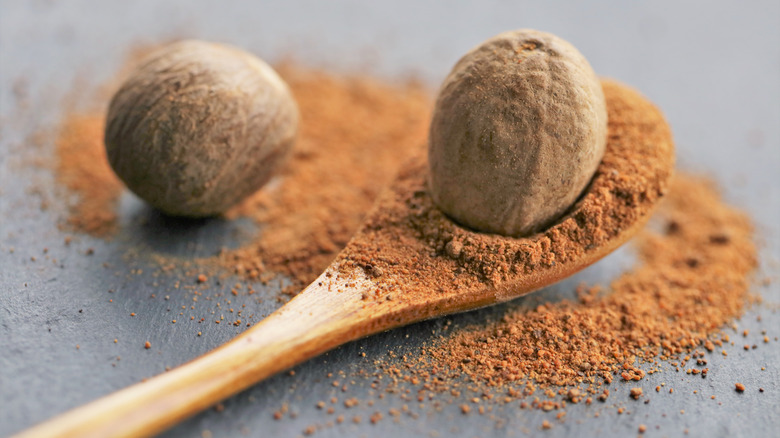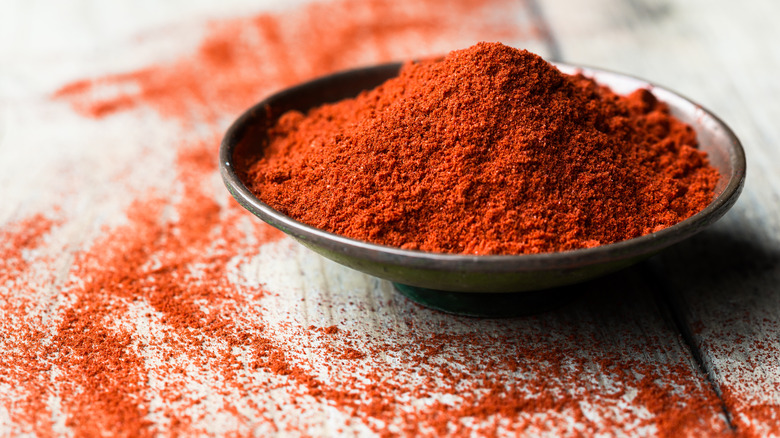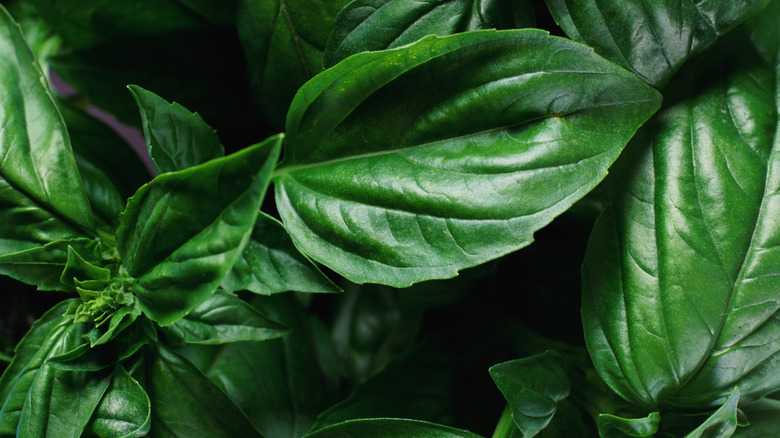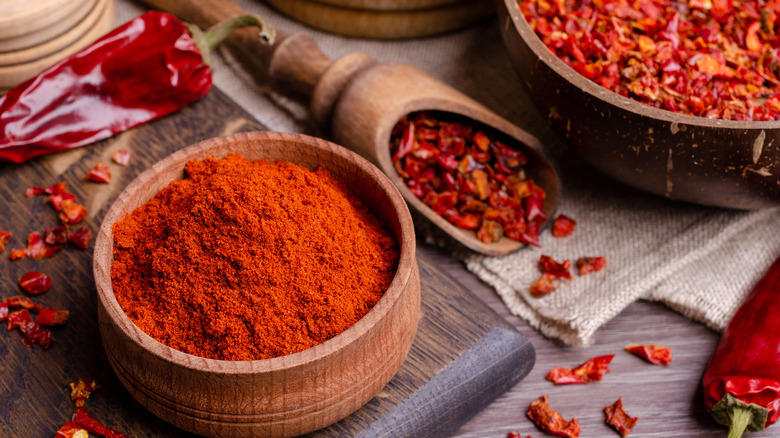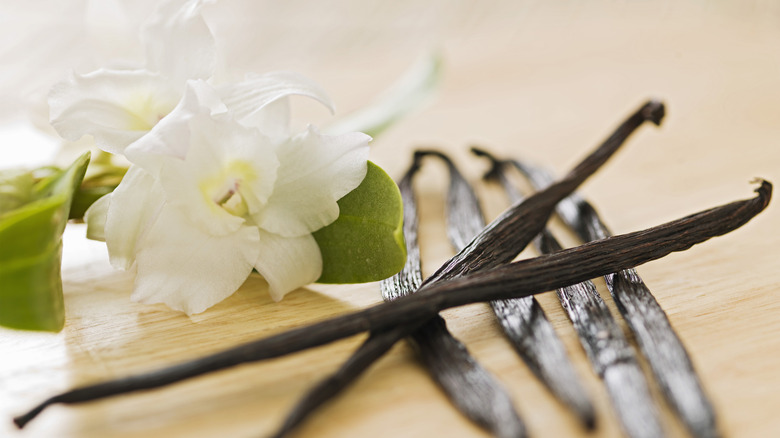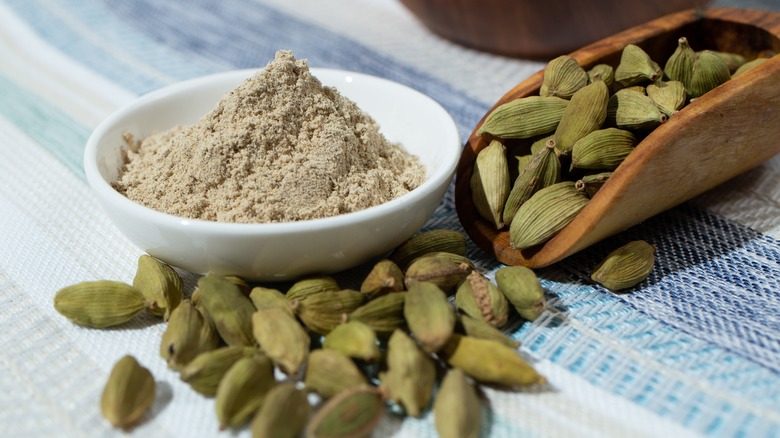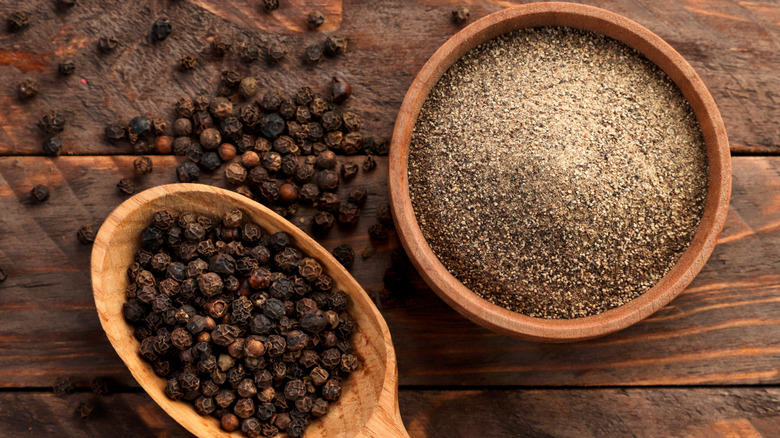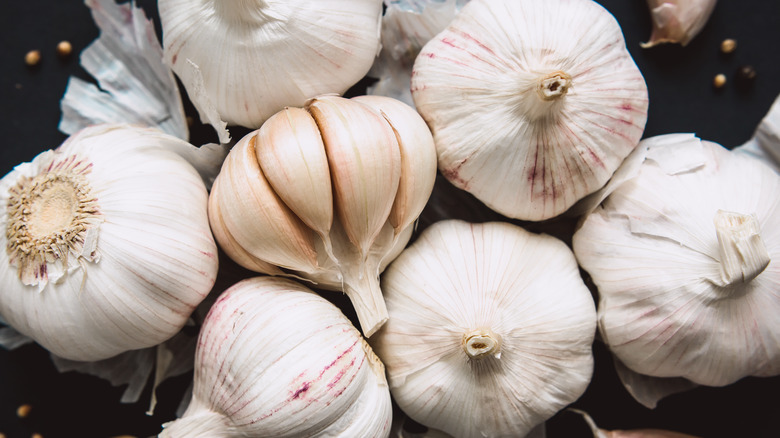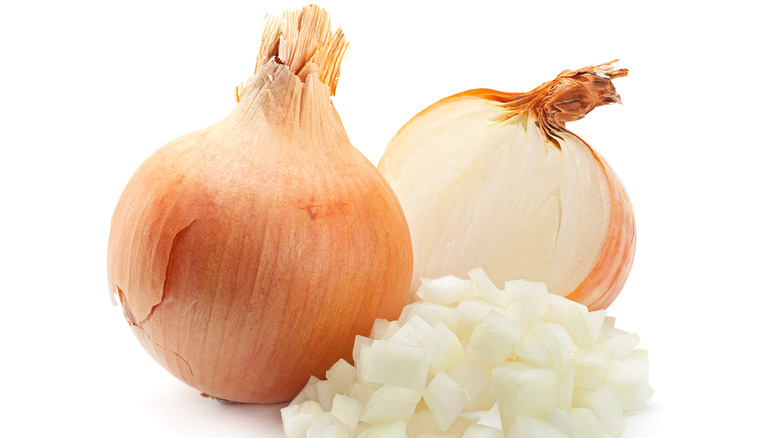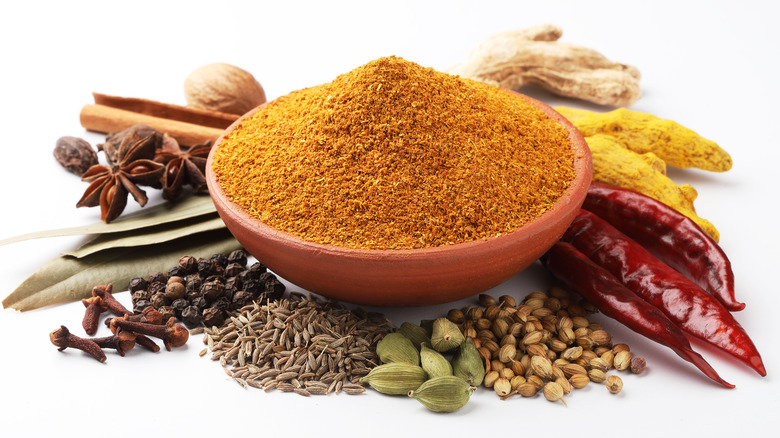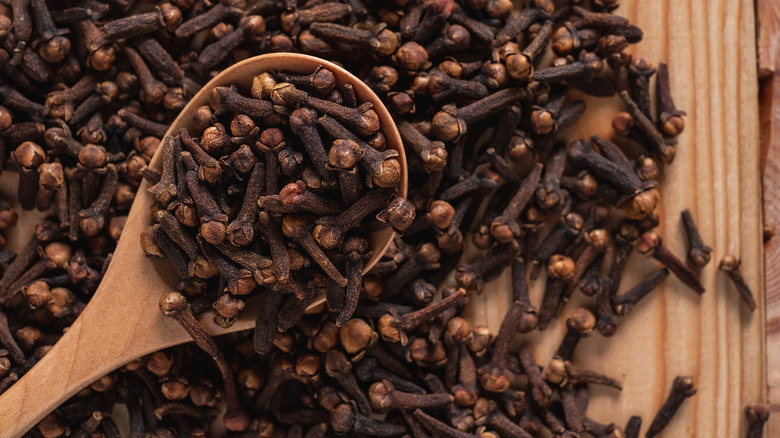12 Spices You Should Never Store In The Freezer
A full and varied spice collection is the crown jewel of any well-stocked kitchen. Any chef worth their salt (or saffron, or cumin) knows that the right spices can truly make or break a dish. No one wants to be caught without the right ingredients for a real showstopper dish. But what happens when you only need a pinch and are left with a full jar remaining and no plans to use it again in the immediate future?
When it comes to long-term storage, most people immediately assume that deep freeze is the best option. After all, there are lots of dishes that are awesome for freezing and reheating later. However, you're going to want to think twice before you start freezing your spices. You might not be doing yourself any favors in the long run depending on what spices you are looking to store. There are several common spices that you're going to want to keep out of the cold in order the keep them at their peak flavor.
Cinnamon sticks
The flavor of cinnamon is so warming. It's one of those spices that can either take center stage in a dessert or pastry or can add background warmth to savory dishes. Most people keep a jar of ground cinnamon in their frequent rotations. However, sometimes you find a recipe that calls for a whole cinnamon stick. You find yourself with a few leftover sticks and you don't want them to lose that beautiful flavor, so what's the best way to store them?
Cinnamon sticks will lose their potent flavor if they're frozen. A flavorless cinnamon stick is just a stick! The good news is that they have an incredibly long shelf life if you handle them properly. An unopened container of cinnamon sticks can last up to four years if you keep them in a dry environment and out of direct light. Once you open the packaging, they're still good for up to two years. Keep them warm and dry and you will find that one package of cinnamon sticks lasting you through many holiday recipes.
Nutmeg
Oftentimes a companion to cinnamon, nutmeg brings warmth and depth to many different dishes. It is best recognized for its contribution to pies or the pumpkin and apple variety, but it also adds dimension to savory dishes like mashed potatoes. This little nut-shaped seed packs a real punch of flavor.
Keep nutmeg out of the freezer, though. Nutmeg, especially when it's ground, has the propensity to mold (per L'Academie). Moisture is the real enemy, here. Freezers, especially ones that are opened and closed often, tend to be surprisingly moist environments. Moldy nutmeg can smell musty and should be disposed of right away to prevent illness.
The best course of action is to keep nutmeg in dry, airtight containers. Store the containers in dark, dry places and they will last you a good long time. Ground nutmeg can last you up to two years while a whole seed is good for close to four years.
Paprika
Often seen as a bright dash of color sprinkled over deviled eggs or New England clam chowder to add a pop of red, paprika is so much more than just a garnish.
Depending on its variety, paprika consists of a blend of dried ground peppers. Its heat and flavor levels are dependent on which peppers are used in the process, and it can either be plain or smoked, Spanish or Hungarian. The world of paprika is actually incredibly nuanced and so much more than just an afterthought.
No matter what the variety of paprika is that you're using, you want to preserve its spicy, peppery flavor for as long as you can. And that means keeping it out of the freezer. While it might freeze without a problem, Pantry Tips warns that the trouble comes when you thaw it out. That's when moisture can get into the spice, sapping the flavor and inviting the threat of mold. Freezing can also cause paprika's strong flavor to dull. Preserve the flavor of your spice by keeping it in an opaque container in a dry, dark place and it will serve you for two to three years.
Basil
Fresh basil is a staple in many Italian dishes. It's also one of those herbs that are very easy to grow at home and keep yourself fully stocked. However, you might find yourself with an overabundance of fresh basil and wonder if you can freeze it to use at a later date.
There's good and bad news when it comes to freezing basil. You can certainly freeze the leaves, either chopped or whole, and they will maintain their flavor. The trade-off is that once the leaves thaw, they have the propensity to turn black or discolored. This discoloration is the result of enzymes in the leaves deteriorating and it doesn't affect the flavor of the herb, just the appearance.
This shouldn't be problematic if you're adding your frozen basil to a soup or sauce since the flavor will still be just as potent as when you froze it. However, if you want that traditional pop of green freshness to sprinkle on top of your pizza or bring vibrancy to your pesto, then you'll want to always use fresh basil.
Chili powder
No pantry is complete without some chili powder. It kicks up any dish that it's added to, from soups to chocolate cake. Chili powder adds an undernote of warmth to whatever dishes it's put into. Much like paprika, this blend of ground peppers can vary in its heat level.
Lucky Belly discourages storing chili powder in either the refrigerator or freezer. They cite the fact that freezers can cause condensation inside whatever container you're storing the chili powder in. Condensation is the enemy of flavor and also can encourage the growth of mold in the fine-powdered spice. The flavor can dull and lose its potency in deep freeze, and once you thaw it, it can clump up. Save yourself the frustration and just keep your chili powder in a cabinet, if possible. Keeping the spice away from direct light will also preserve its bright color, so an airtight tin or opaque container is your best bet for ensuring your chili powder keeps its kick.
Vanilla beans
Vanilla beans are so beautiful and fragrant. They're derived from orchid plants and are laboriously cultivated to ensure the world has this pivotal ingredient that's used in baking and cooking almost universally. Because they're hand-pollinated and require so much labor and resources, pure vanilla bean pods tend to be fairly pricy. With that in mind, you want to store them properly.
Freezing vanilla beans can leave them susceptible to rot and mold, according to Native Vanilla. Vanilla beans are best stored at room temperature. The cold of the freezer can dry the pods out, or, worse, the condensation within the freezer can promote mold growth on the beans.
Store your fresh vanilla beans in an airtight container, away from direct sunlight. Check them every few weeks to make sure there's no moisture accumulating in the container. Native Vanilla also recommends taking your vanilla beans out of the container to breathe every eight weeks. Like the delicate flower they're harvested from, vanilla beans need to be treated carefully and mindfully.
Cardamom
Cardamom is one of those flavors that is hard to describe but is instantly recognizable. Green cardamom's fragrance is like an intersection between eucalyptus, mint, and pepper that brings a certain sweet, herbal warmth to dishes and spice blends. It makes appearances in chai tea blends and garam masala. It's actually a member of the ginger family and carries with it that gingery zing that is so important to its flavor profile.
Cardamom can be frozen, but if you do freeze it, you run the risk of taking that snappiness away from its flavor. It makes no sense to drain the zing out of your spices before they can be used, especially when that punch it carries is so integral. So in order to preserve its flavor you want to store it at room temperature. If you can, buy cardamom seeds whole and grind them as you need them, since whole cardamom pods can last you up to two years.
Black peppercorns
If your cupboards are barren of spices, the very least you should have is salt and pepper. They're the OG team of seasoning and practically a requirement for every dish you could concoct. If you see the term "season your meat" in a recipe, it's referring to cracking a healthy dose of salt and fresh ground pepper onto the food before cooking it. Pepper is a cornerstone of building flavor, and as such, the peppercorns need to be properly stored in order for them to bring their maximum potential.
As far as temperamental spices go, peppercorns are actually very easy to store and care for. They just need an airtight container and a cool, dry storage area. There's very little reason to freeze peppercorns, but if you do, you might find that their flavor intensifies. This can be a good or a bad thing, depending on how strong you like your pepper.
Garlic
Nothing beats the smell of chopped garlic and butter sautéing on the stove. It's so simple and immediately delicious. Garlic is also one of those ingredients that you might find yourself wanting to prep in bulk ahead of time so that you can save some time when you're cooking.
Garlic actually retains its flavor quite well when you freeze it, but there are a few caveats that you will want to be aware of before you start crushing your cloves. Garlic runs the risk of turning bitter when it is frozen and thawed. Its flavor can grow stronger and unpleasant, which might negate the time-saving factor of freezing it in the first place.
The other issue that you might run across in freezing garlic is the chance that the pungent odor seeps into other food in your freezer. If you plan on storing garlic in the freezer, don't put it in plastic. Instead, you want to use glass, which will keep all the garlic odors contained and off of your Rocky Road.
Onions
While not necessarily a spice, onions are a major component of building flavor in a dish. Their ability to survive a trip to deep freeze is wholly dependent on how you plan on using them.
Chopped raw onions can be frozen in an airtight container, sealing in their flavor, and also protecting your other food from becoming onion-y. Once you thaw them out, however, you might notice that they're mushier than when they were fresh. The freezing process damages the cell walls of the onion, meaning that it's going to have a completely different mouthfeel.
The thawed onions are completely fine to be used in soups and sauces and any instance when you're planning on cooking them. You won't want to eat them raw, though. Just chop a fresh onion if you plan on putting it on your salad. It's worth the extra effort of prepping the onion fresh rather than serving a mushy pile of thawed onion.
Curry powder
Curry is a dish that typically freezes very well and can be made in large batches to save and then eat later. However, the spice blend of curry powder doesn't take kindly to being frozen.
Curry powder is a blend of many different spices. The curry blends vary depending on which region of India you're in, and can even vary from family to family, meaning that no curry blend is exactly the same.
The basic components of curry are turmeric, cumin, coriander, ginger, and cinnamon. According to the National Center for Home Food Preservation, if you freeze a curry spice blend, it can get musty-tasting. This can happen if the spices that make up the blend start to mold or their flavors deteriorate during the freezing process. Instead of freezing your curry powder, keep it with your other spices in a dry, dark area where it is protected against light and moisture. Only freeze the full dish once it is made — it will be so much better.
Cloves
Cloves are another spice you might only find yourself using once in a blue moon and find yourself looking to store until the next time you make gingerbread or chai. Whole cloves resemble small nails and have a woody texture. They're the dried flower bud of an evergreen tree that is found in Indonesia. Their unmistakable warming flavor is often found in baked goods and also in curry blends.
Much like cinnamon sticks, it's imperative to keep cloves dry. If you freeze cloves, not only does their strong flavor being to wane, but they run the risk of developing mold. Whole cloves have a long shelf life, with whole cloves retaining their potent flavor for up to a year if they're kept in a dry, air-tight container.
Investing in a set of air-tight tins will ensure that all your spices will last far longer than sending them to deep freeze.
